Best beginner DJ mixers 2025: The best entry-level club, scratch and rotary DJ mixers to get you started
Get to grips with the basics of mixing and scratching with these cheap and entry-level mixers
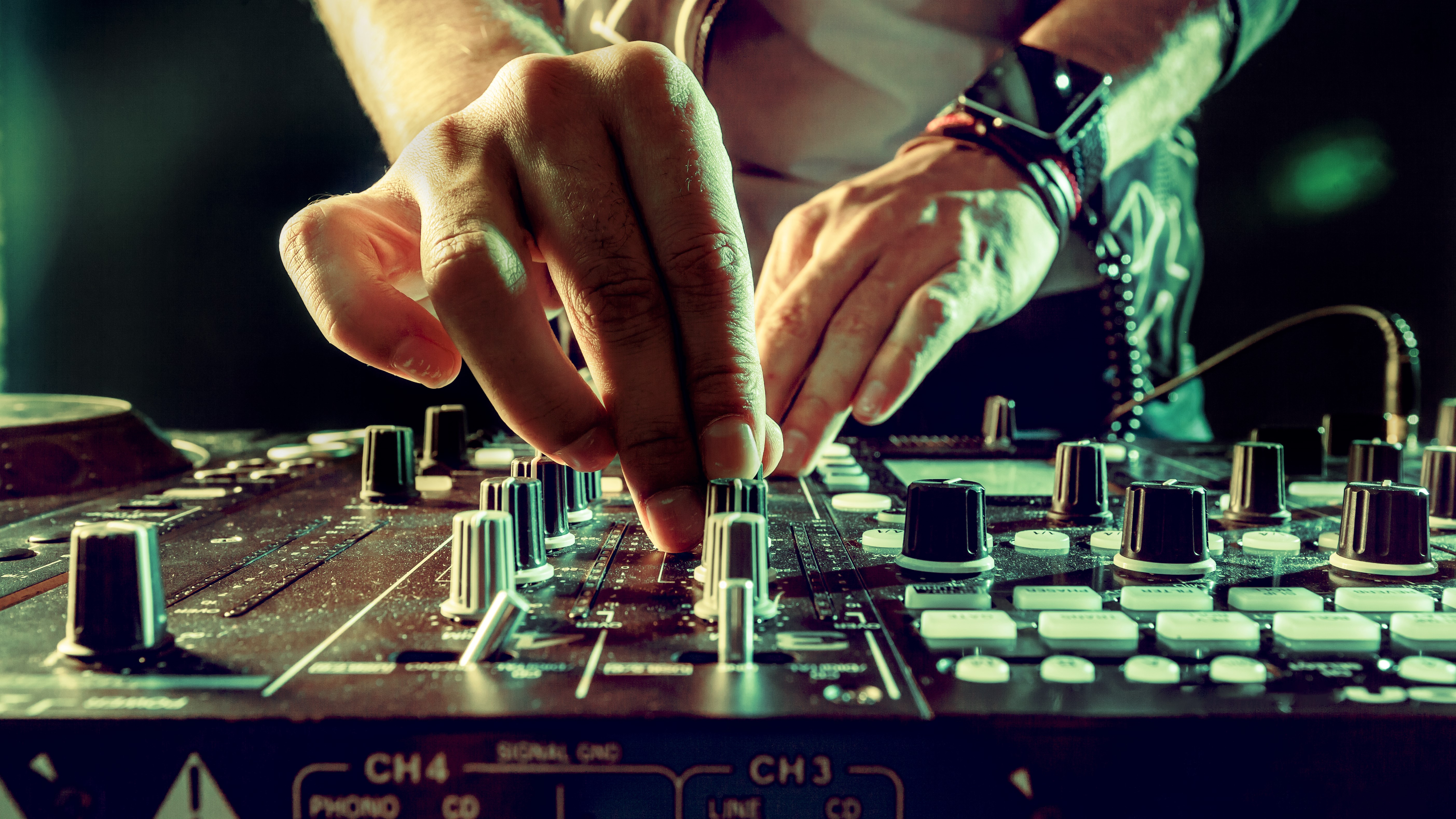
Want all the hottest music and gear news, reviews, deals, features and more, direct to your inbox? Sign up here.
You are now subscribed
Your newsletter sign-up was successful
When it comes to DJ set-ups, a DJ mixer is pretty fundamental, and choosing the best beginner DJ mixer is an important decision for aspiring DJs.
Starting with the basics, a mixer is a device that allows the DJ to ‘mix’ two or more sources of music together into a single output. It enables DJs to audition other songs in their headphones independently from what’s being played over the master output, to find the correct starting or ‘cue’ point on the next track and to blend tracks together.
DJ mixers come in many shapes and sizes: from small two-channel home machines to professional club mixers with multiple inputs, comprehensive FX sections and a set of performance pads. Laptop DJs meanwhile, might use the virtual mixer built into their DJ software, and many all-in-one DJ controllers have a mixer section built in. But from the most sophisticated to the most basic, they all perform the same function.
My focus for this round-up is standalone hardware units, all of which – with one exception – don’t require a laptop to function, and which provide inputs to connect CDJs, vinyl turntables or any music player you choose.
If you'd like to know what my top pick is, then here it is: The Pioneer DJ DJM-250MK2 - a mixer that provides a bunch of flexibility, onboard filters and more.
I've also offered buying advice and answered common questions to give you further information on what to look for in a DJ mixer and on how to work out which machine will be best for your needs.
Our top picks
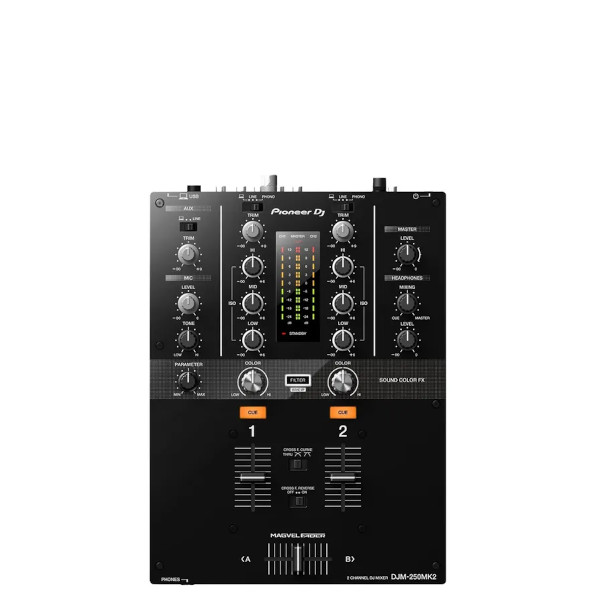
Our top pick goes to the excellent Pioneer DJ DJM-250MK2. It might not have all the bells and whistles associated with other DJMs, but with in-built audio interface and more, there's a lot to love about Pioneer's entry level mixer.
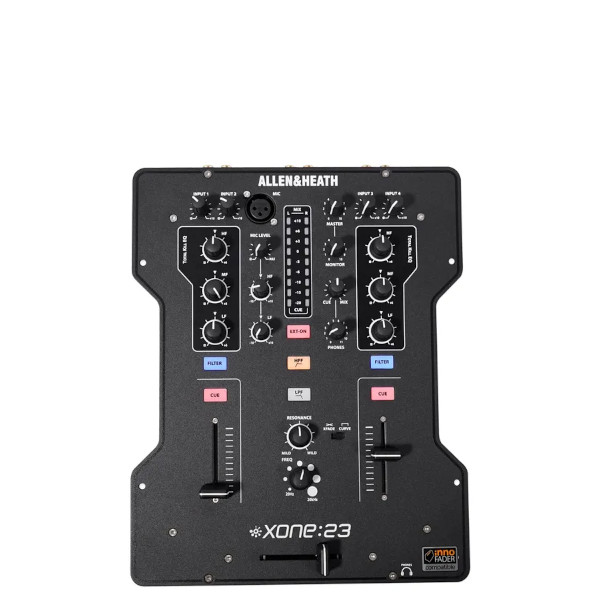
The Allen & Heath Xone:23 has some decent features for a DJ mixer in this price bracket, including an external effects loop, so you can add multi effects to really get creative. Just be aware that there's no digital compatibility here.
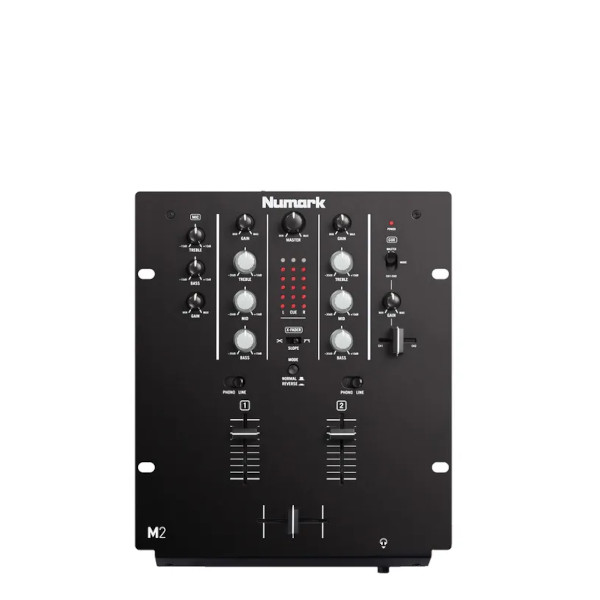
The Numark M2 might be basic, but for the price, it's an ideal buy for budding DJs. You won't get much in the way of added extras, but it's a great mixer to mess around and learn the ropes. Lack of ability to expand is a downside though.
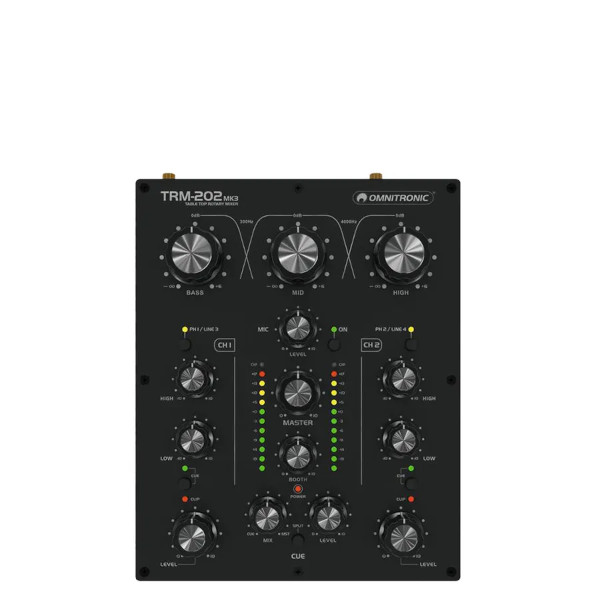
Rotary mixers are usually associated with the audiophile end of the market, but what the Omnitronic TRM-202 MK3 manages to do is body swerve the expensive price tag, making it a great option for budget-conscious DJs.
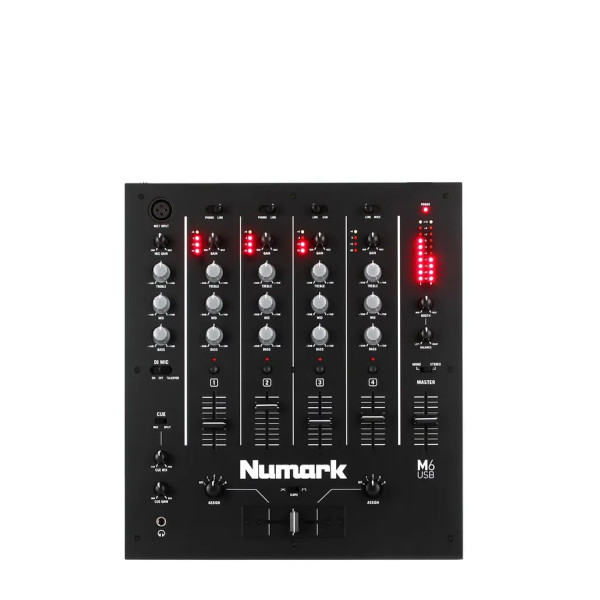
With four fully-fledged mixer channels, each with its own fader and three-band EQ, there's a lot to love about the M6. USB compatibility is catered for, but there's no multi-track functionality. Still, a great option for a club mixer.
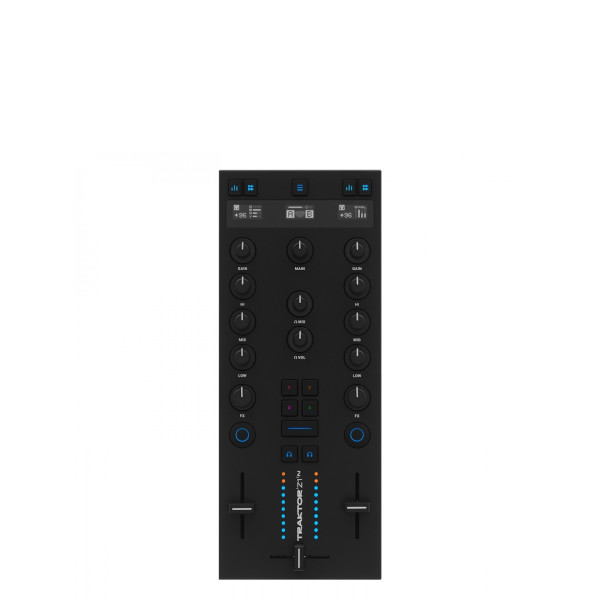
The Native Instruments Traktor Kontrol Z1 Mk2 has no physical inputs and works through the Traktor Pro 4 mixing software (which is included) making it an ideal choice for laptop mixing. It also has OLED displays which is a nice touch.
Best overall
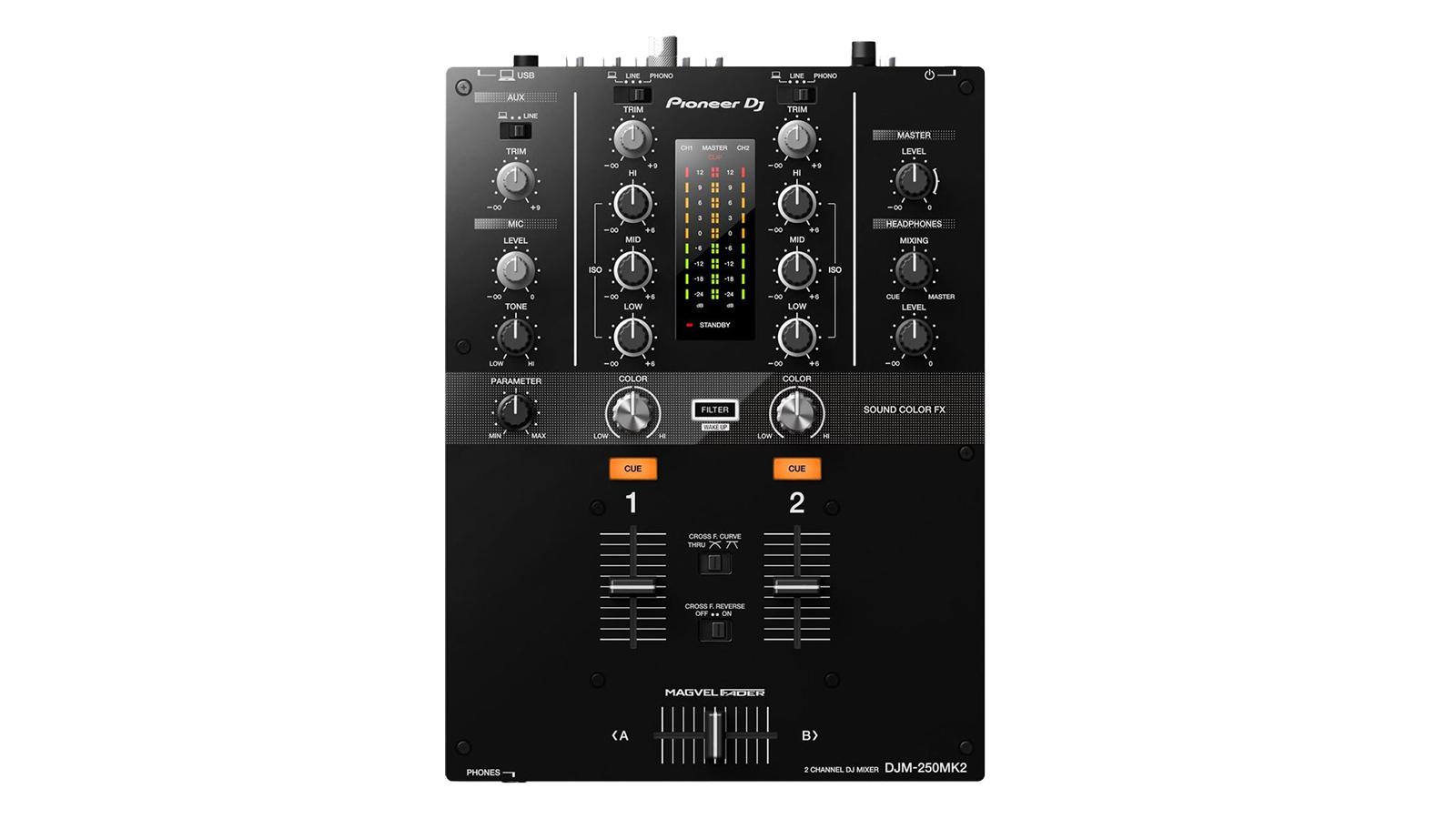
1. Pioneer DJ DJM-250MK2
Our expert review:
Specifications
Reasons to buy
Reasons to avoid
✅ Buy if you want a solid entry level mixer with added extras: This is the Japanese firm's entry-level mixer but it offers extra features, including a built-in audio interface.
❌ Avoid if you're on a tight budget: Entry level it may be, but the price certainly isn't. Shop around for something cheaper if money it tight.
Build quality: ★★★★★
Features: ★★★★★
Ease of use: ★★★★★
Overall: ★★★★★
Pioneer’s dominance over DJ mixers isn’t quite as total as its ubiquity in the CDJ realm, but the Japanese brand’s DJM range is still a popular choice among pro and amateur DJs alike. The 250 is the entry point into that range.
This two-channel mixer is relatively bare-bones compared to higher-end DJMs, but still has some neat tricks up its sleeve that put it above many other entry level devices. One such feature is the built-in audio interface, meaning you can hook this mixer up to physical players such as CDJs or turntables, a DJ laptop-based set-up, or some combination of the two.
In fact, the DJM-250Mk2 is even compatible with digital vinyl systems (DVS) which allow users to control digital tracks within a laptop using special timecode vinyl records or CDs. A nice touch for a piece of entry-level gear. The onboard interface also makes it easy to record your DJ mixes into a computer.
While there’s no effect capabilities to speak of, both channels offer three-band EQs and a dedicated filter, which are flexible enough to achieve smooth, pro-sounding mixes. There’s a dedicated mic channel too. In all, this is a very well-rounded package for budding DJs.
Best analogue
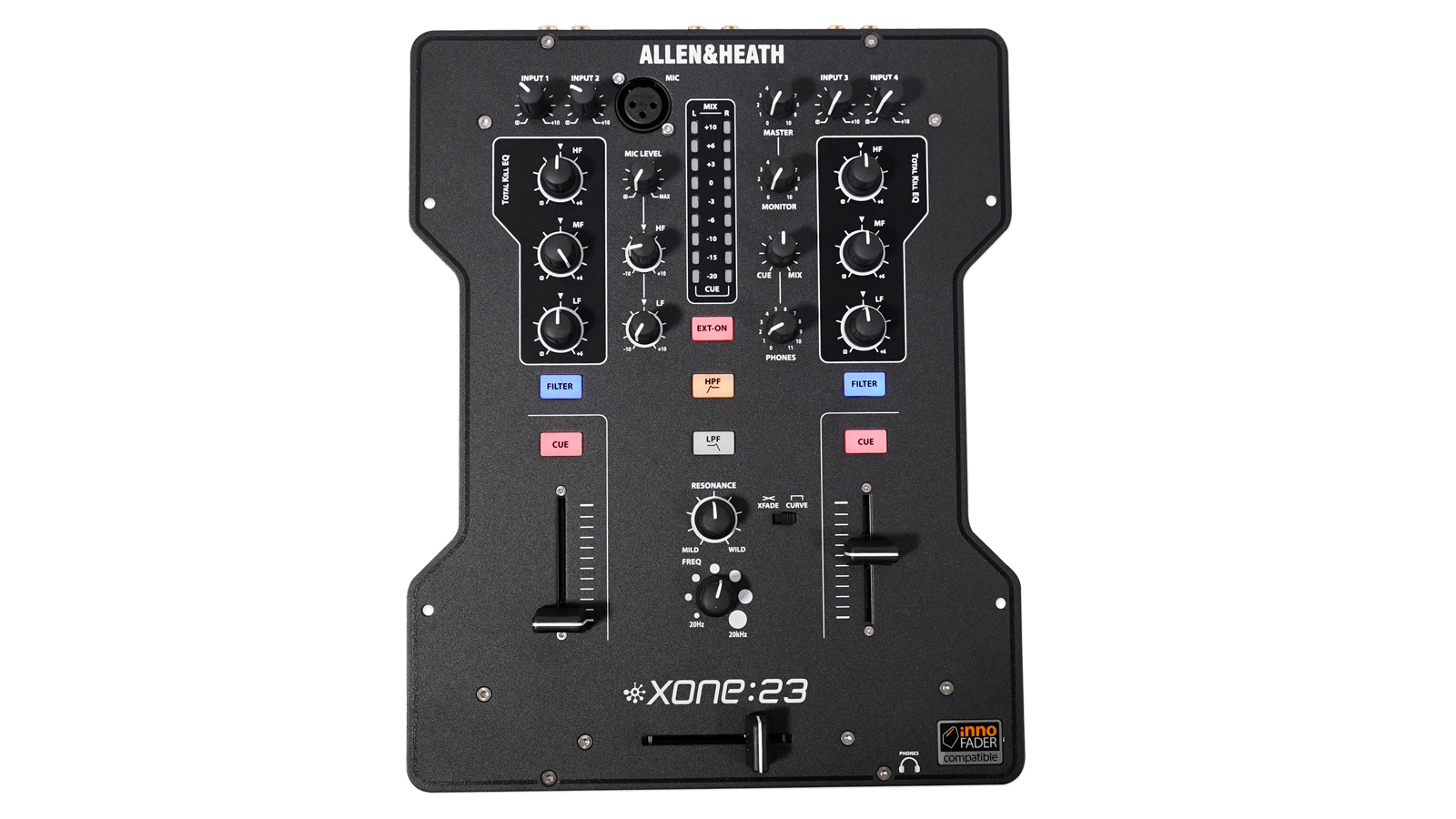
2. Allen & Heath Xone:23
Our expert review:
Specifications
Reasons to buy
Reasons to avoid
✅ Buy if you want a no nonsense mixer which punches above its price point: The Xone:23 has an external effects loop, which allows you to add pedals or a multi-effect unit for a new twist on mixing.
❌ Avoid if you need digital compatibility: It's one of the simplest mixers in Allen & Heath's range and as a result it lacks lacks any digital compatibility.
Build quality: ★★★★★
Features: ★★★★½
Ease of use: ★★★★★
Overall: ★★★★★
Along with Pioneer’s DJM range, Xone DJ mixers from British brand Allen & Heath are some of the most popular tools among club DJs. The 23 is the cheapest and simplest in the range, but it’s still a quality mixer with some nice features for a device at this price point.
What I like about the 23 compared to some of the other two-channel analogue mixers in this round-up is its scope for expandability. Yes, there are only two mixer channels available here, but each comes with dual rear-panel inputs (one line/one phono) and a convenient front-panel switch, meaning you could, for example, attach both turntable and CDJ and switch between the two.
Similarly, while there’s no onboard effects, the Xone:23 includes an external effects loop, allowing you to add pedals or a multi-effect unit to introduce new mixing techniques.
It’s not the cheapest two-channel mixer in this line-up – and it lacks any digital compatibility – but this is a robust device with the scope to grow with you as your mixing skills evolve.
Best budget
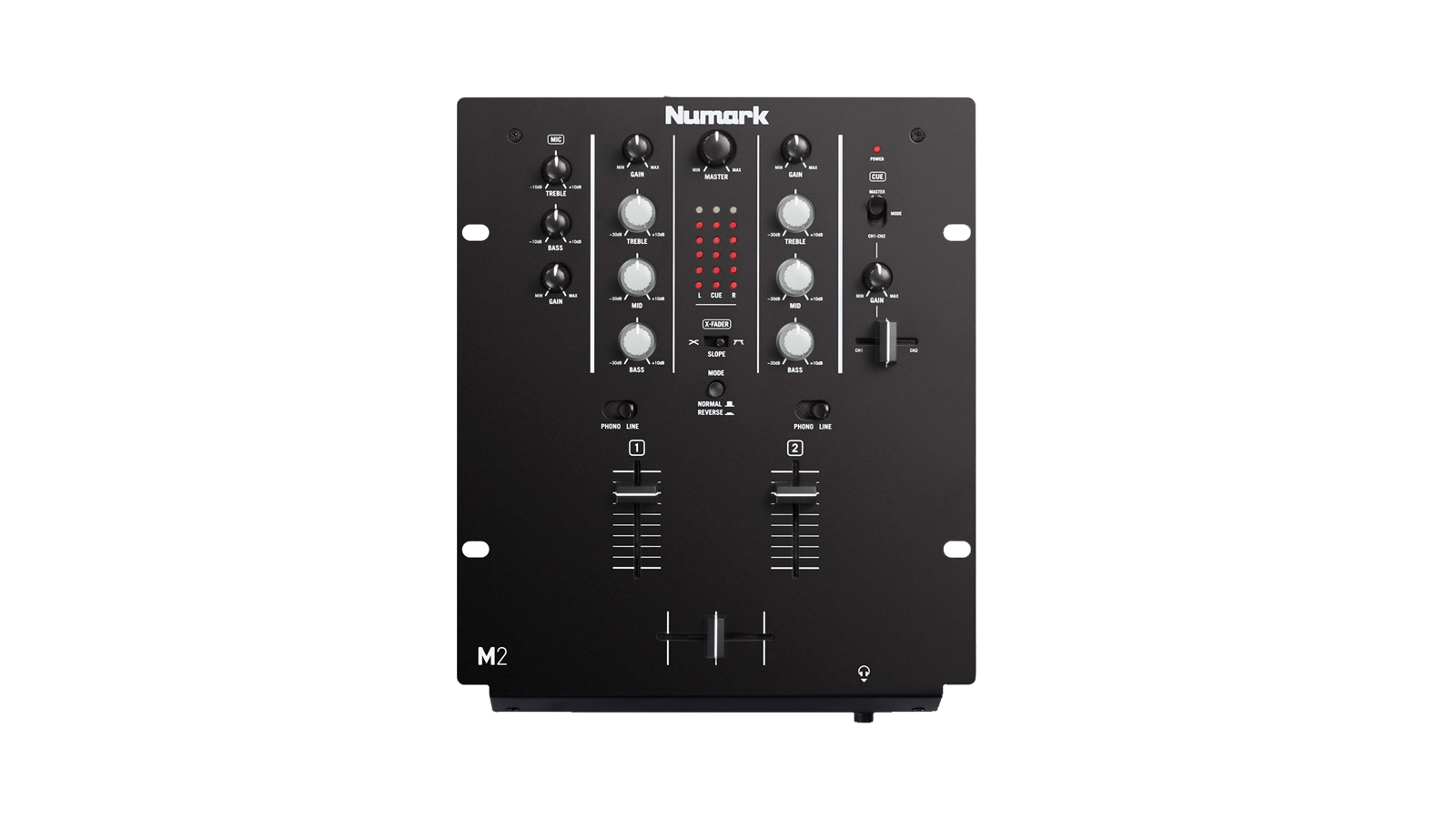
3. Numark M2
Our expert review:
Specifications
Reasons to buy
Reasons to avoid
✅ Buy if you're just getting started and want a well-priced mixer: It might be on the basic side, but if you're just getting started and want a cheap and cheerful mixer, then look no further.
❌ Avoid if you have a bit of experience under your belt: Great for budget-focused beginners, but be aware you can't expand your set-up here and no digital compatibility.
Build quality: ★★★★
Features: ★★★★
Ease of use: ★★★★★
Overall: ★★★★★
While Numark also make some impressive mid- and pro-level DJ gear, they’ve long been a favourite at the entry-level end of the market.
The M2 is about as basic as DJ mixers get. There are two channels here, each switchable between line and phono inputs for CDJ or turntable connections.
Each channel has a fader, a separate gain knob, three band EQ and there’s a crossfader for blending/cutting between the two. There’s also a mic channel with its own EQ and gain and a headphone output with crossfader-controlled cueing.
The M2 has all you need to learn the basics of mixing or scratching, and makes a solid choice for a first set-up. Its main drawback is lack of expandability when you want to take things further. There are no effects or any way to incorporate external ones, plus no digital compatibility that might let you get more creative as your skills progress.
The EQs and gain controls lack the subtlety and responsiveness of higher-end mixers too, although on the whole build quality is rugged and plenty durable.
Best rotary
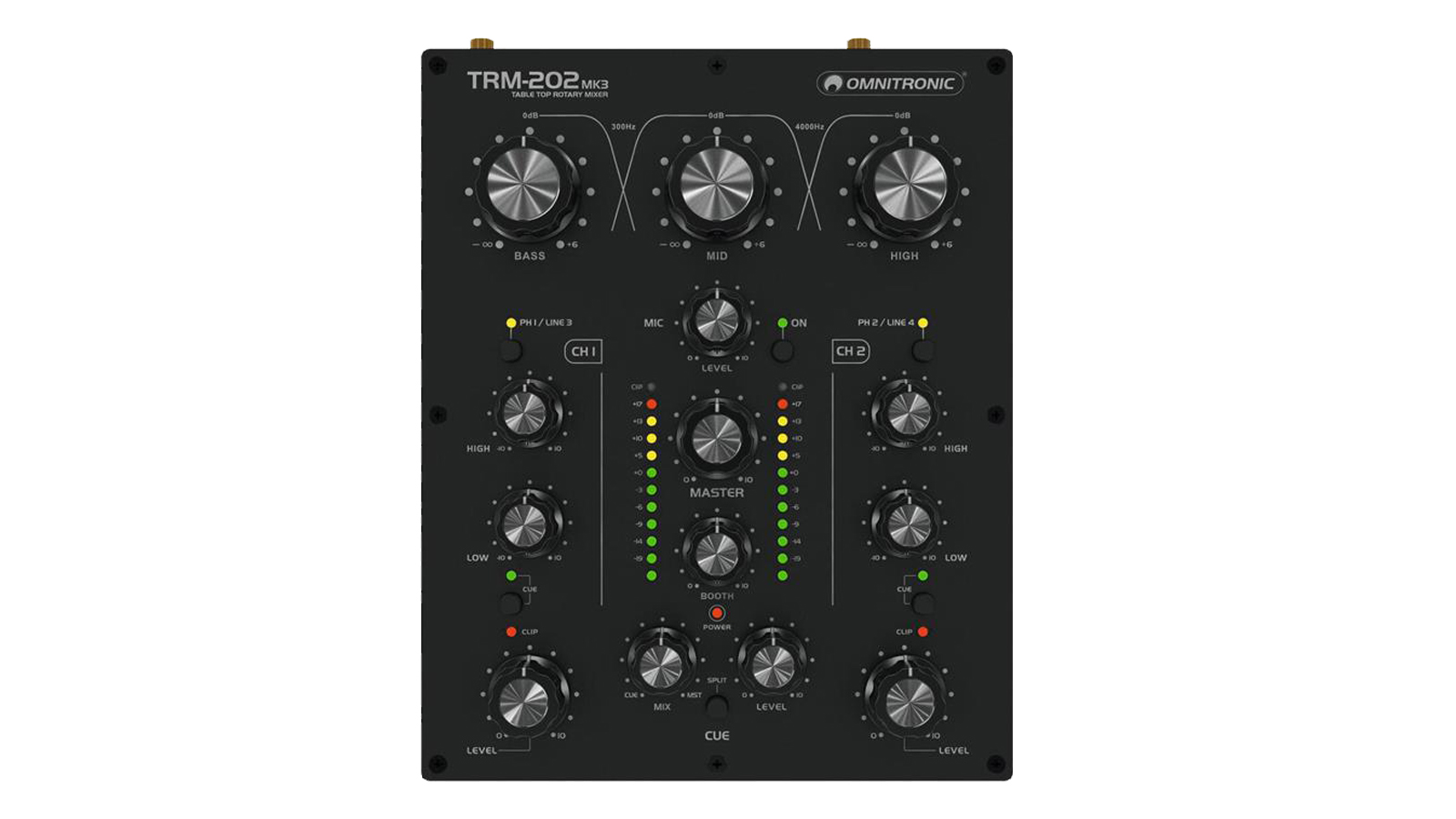
4. Omnitronic TRM-202 MK3
Our expert review:
Specifications
Reasons to buy
Reasons to avoid
✅ Buy if you're after an old-school rotary mixer for a competitive price: Rotary mixers usually cater for audiophiles, but the TRM-202 MK3 neatly swerves the expensive price tag.
❌ Avoid if techno and house aren't your thing: The TRM-202 MK3 is a great option for dance DJs, but it's not a model that'll suit everyone.
Build quality: ★★★★★
Features: ★★★★
Ease of use: ★★★★★
Overall: ★★★★★
Rotary mixers have something of a cult following among a certain subset of DJs. This is a style of mixer that trades the common faders found on most mixers for round knobs, or rotaries. New York DJ icon Larry Levan was a notable user of classic rotaries, and although it could be argued that they are a relic of a bygone age, a significant number of club DJs still love them.
Rotaries are also commonly associated with high-end, audiophile gear that comes at a hefty price. The TRM-202, from Omnitronic, is notable for being an undeniably classy-looking rotary mixer at an affordable price point.
There’s little in the way of bells and whistles here – for the most part the TRM-202 is a simple 2-channel mixer. The key feature is the chunky, tactile three-knob isolator EQ that sits along the top of the unit. This is joined by high and low EQs for each channel, which combine to offer plenty of sound shaping.
Rotary mixers aren’t for everyone – their design suits long and slow blends best for house and techno – but for the price, the build and sound quality is impressive here.
Best club mixer
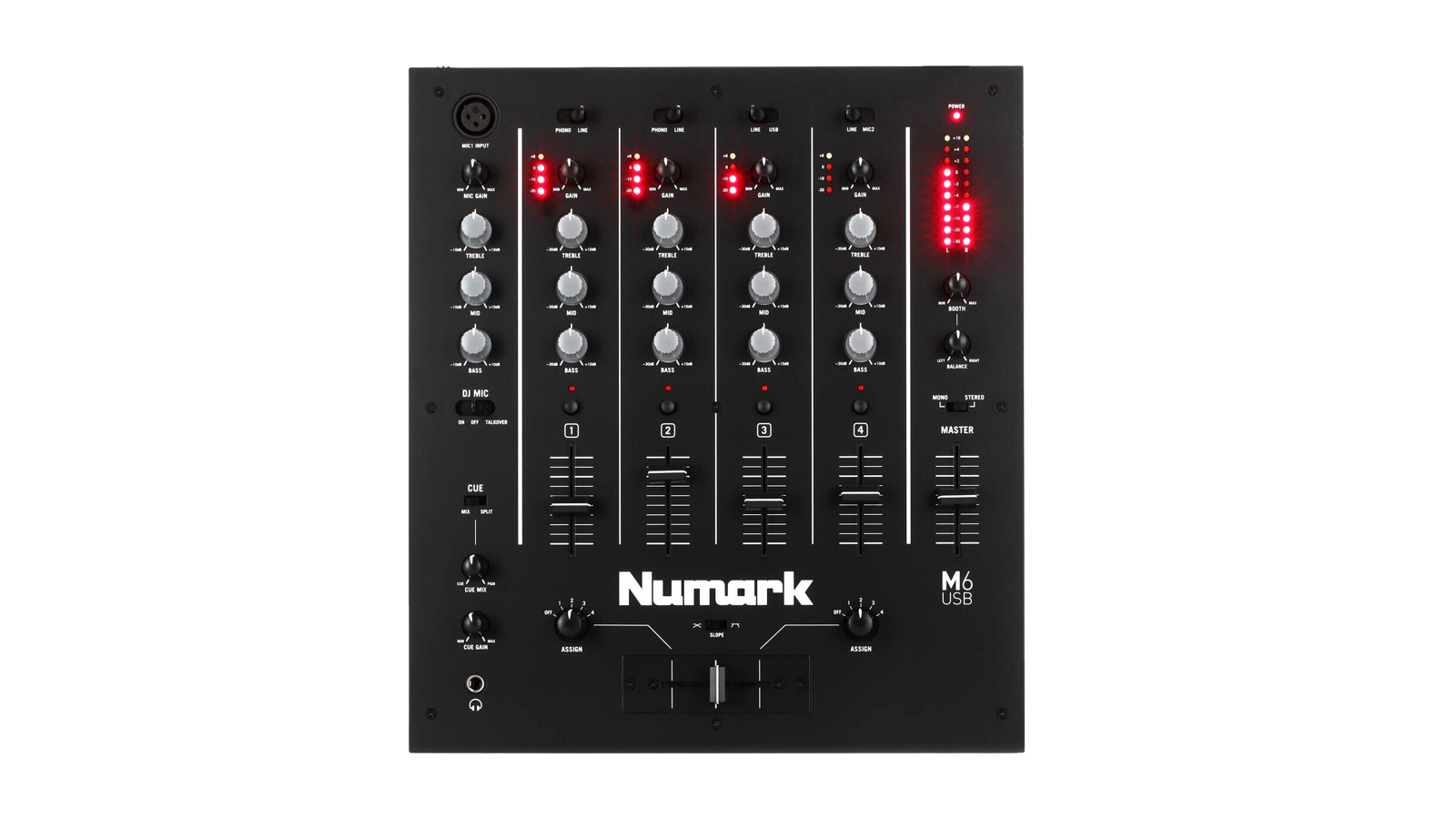
5. Numark M6 USB
Our expert review:
Specifications
Reasons to buy
Reasons to avoid
✅ Buy if you want a flexible, four channel mixer: You've probably noticed that the majority of beginner DJ mixers in the guide have 2 channels. The M6 doubles that giving it more flexibility.
❌ Avoid if you want multi-track streaming: The TRM-202 MK3 is a solid option, but bear in mind there's multi-track streaming to be found.
Build quality: ★★★★½
Features: ★★★★
Ease of use: ★★★★½
Overall: ★★★★½
Much like the M2 above, Numark’s M6 USB is a simple, no-frills beginner DJ mixer offering the tools you need to get going at a bargain price. However, whereas the M2 has just a pair of inputs with little expandability, the M6 is more flexible right out of the box.
The main selling point here, compared to the majority of other mixers at this price, is the inclusion of four fully-fledged mixer channels, each with its own fader and three-band EQ. That’s on top of an independent mic channel too.
As the name suggests, there’s some USB compatibility here too. The M6 features a built-in audio interface, meaning it can stream audio to or from a computer.
However, don’t expect full multi-track streaming from Serato or Traktor – this is a single channel affair, meaning you can stream audio to just one hardware mixer channel (fixed to channel 3) or send the master into your computer for recording.
Best for laptops
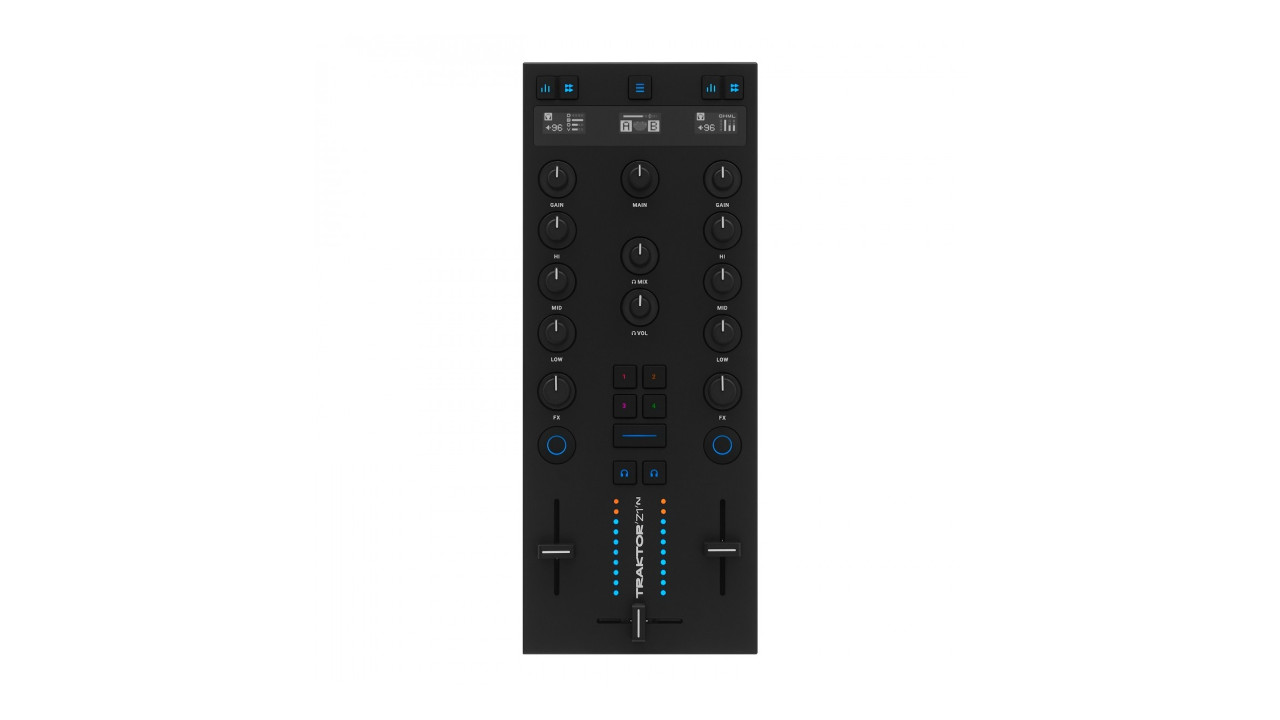
6. Native Instruments Traktor Kontrol Z1 Mk2
Our expert review:
Specifications
Reasons to buy
Reasons to avoid
✅ Buy if you want a portable mixer for your laptop: There are no physical inputs here and can hook up with your laptop using Traktor Pro 4 which comes with the unit.
❌ Avoid if you need a USB connection: The lack of physical inputs means if you need USB C, then you're out of luck.
Build quality: ★★★★½
Features: ★★★★
Ease of use: ★★★★
Overall: ★★★★
Native Instruments' Mk 2 version of its excellent Z1 is a little different to the majority of mixers in this round-up, in that it offers no physical inputs. Instead, this device is designed for controlling the virtual mixer inside the laptop version of the company’s mixing software Traktor, and so comes with a full version of Traktor Pro 4.
It's set up exactly like a standard 2-channel DJ mixer with a crossfade at the bottom and a pair of volume faders, FX and 3-band EQ for each channel.
Although the controls adjust settings within the software itself rather than within the mixer, the MusicRadar certainly found that when we tested the Z1 it felt exactly like using a standard mixer.
One of Traktor 4’s new features is stem separation, so the Z1’s feature set includes hands-on stem control, and NI has also added new OLED displays which provide useful real-time feedback so you don’t have to spend your gig staring at your laptop.
Best Bluetooth
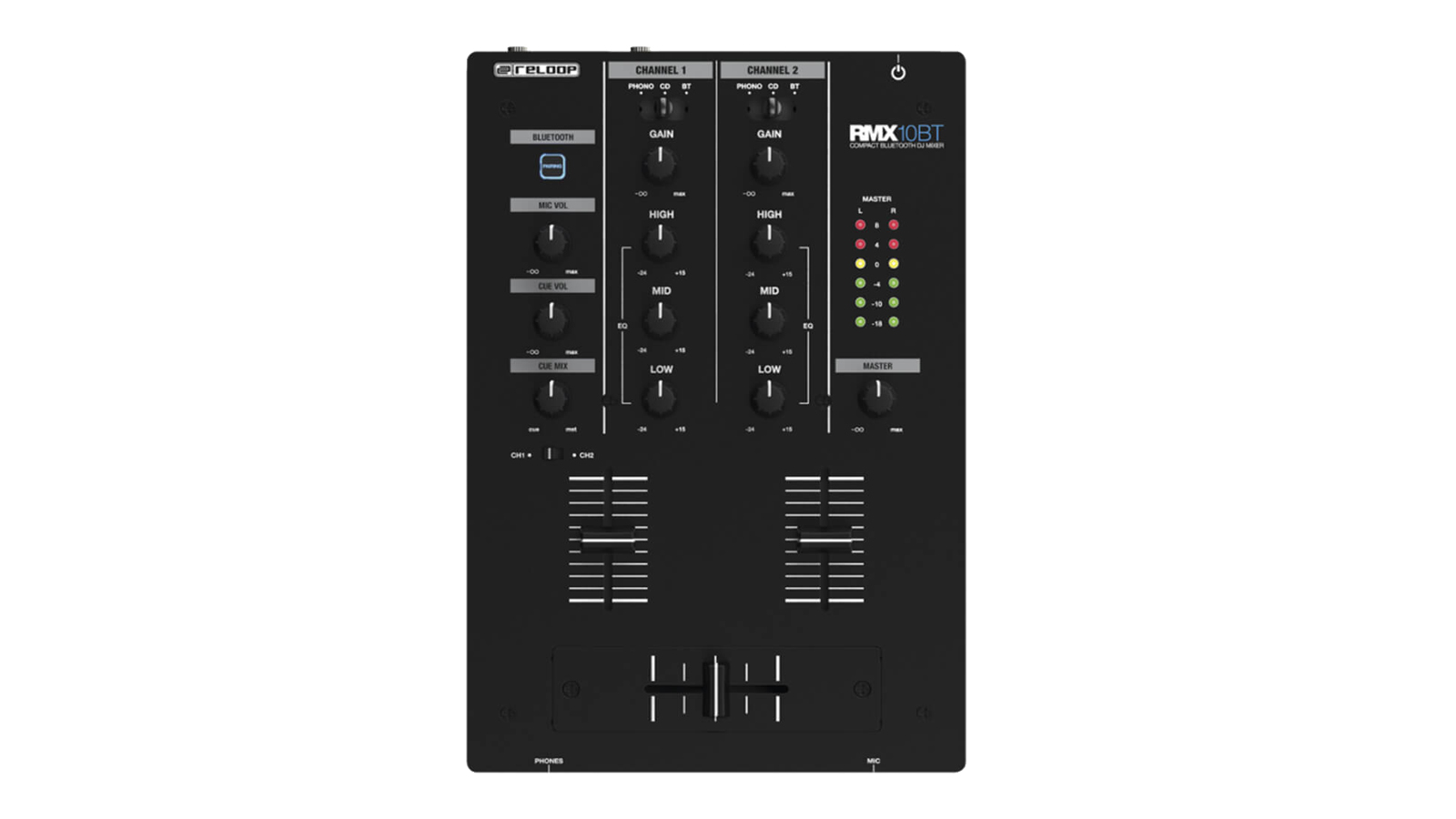
7. Reloop RMX-10 BT
Our expert review:
Specifications
Reasons to buy
Reasons to avoid
✅ Buy if you want a Bluetooth-enabled mixer: The convenience of Bluetooth is included with the RMX-10 BT, meaning you can use a phone or tablet as a streaming input to either of the channels.
❌ Avoid if you need filters or effects: You won't find these extras here, but for the price you're paying, it's hard to complain too much.
Build quality: ★★★★
Features: ★★★★
Ease of use: ★★★★½
Overall: ★★★★
For the most part, Reloop’s RMX-10 is another no-nonsense entry-level mixer. Specs are, for the most part, pretty standard: there are two mixer channels with three-band EQ and gain, a crossfader and separate mic channel with EQ.
Where the RMX-10 BT sets itself apart is with the inclusion of Bluetooth, meaning it’s possible to use a device such as a phone or tablet as a streaming input to either one of the channels.
Each also has both line and phono inputs on the back for CDJs or turntables.
As a result, the RMX-10 BT is a good choice for beginner or home users that want to blur the lines between DJing and a home listening set-up.
Being small and lightweight, it’s a handy choice for house parties too.
Best for scratching
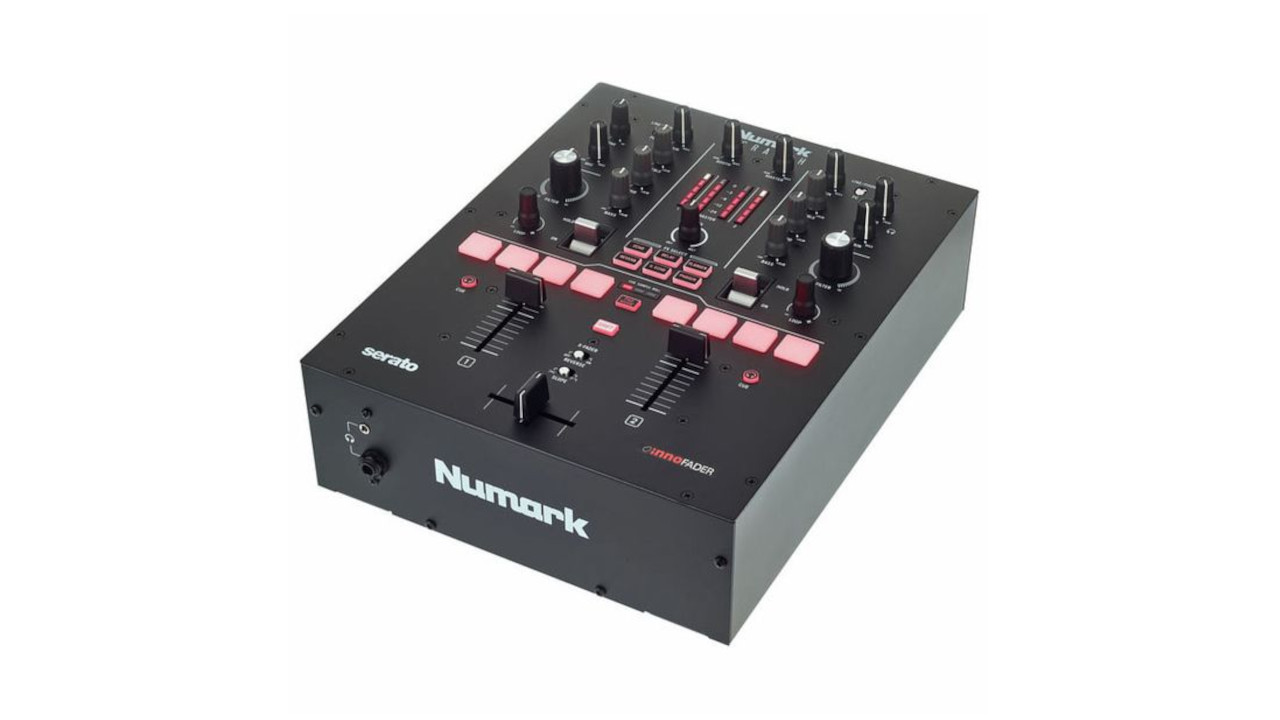
8. Numark Scratch
Our expert review:
Specifications
Reasons to buy
Reasons to avoid
✅ Buy if you want a well-equipped mixer with a good set of functions: The Numark Scratch is full-featured and includes two channel faders, 3-band EQ and mic section.
❌ Avoid if you want to grab a cheaper mixer: First-timers may well be put off by the higher price, but you're getting a lot of quality for your cash.
Build quality: ★★★★
Features: ★★★★
Ease of use: ★★★★
Overall: ★★★★
For digital turntablists and those who want to hook a real-world set of vinyl desks up to a virtual mixing system, Serato DJ Pro remains an immensely popular choice. Unfortunately, the entry price for these sorts of set-up is fairly high (even before you’ve factored in the cost of a set of turntables).
Numark’s Scratch 2-Channel mixer is a solid budget-level battle mixer that comes with a full Serato DJ Pro licence and is equipped with the standard pair of channel faders, 3-band EQ and mic section. It also has a low pass/high pass filter, eight sample pads, six FX and a pair of chunky FX ‘hold/on’ rocker switches. The crossfader and channel volume section is roomy with no distractions or controls getting in the way of the all-important highly reliable InnoFADER crossfade.
Round the back you get a USB input but you also get a pair of RCA phono inputs which are switchable between line and phono for if you also want to connect CDJs or vinyl decks.
Higher-end units will likely come with more, larger, and more responsive sample pads, but the eight here, along with the FX toggle buttons and dedicated filter make for a good suite of functions for starter-turntablists.
FAQ
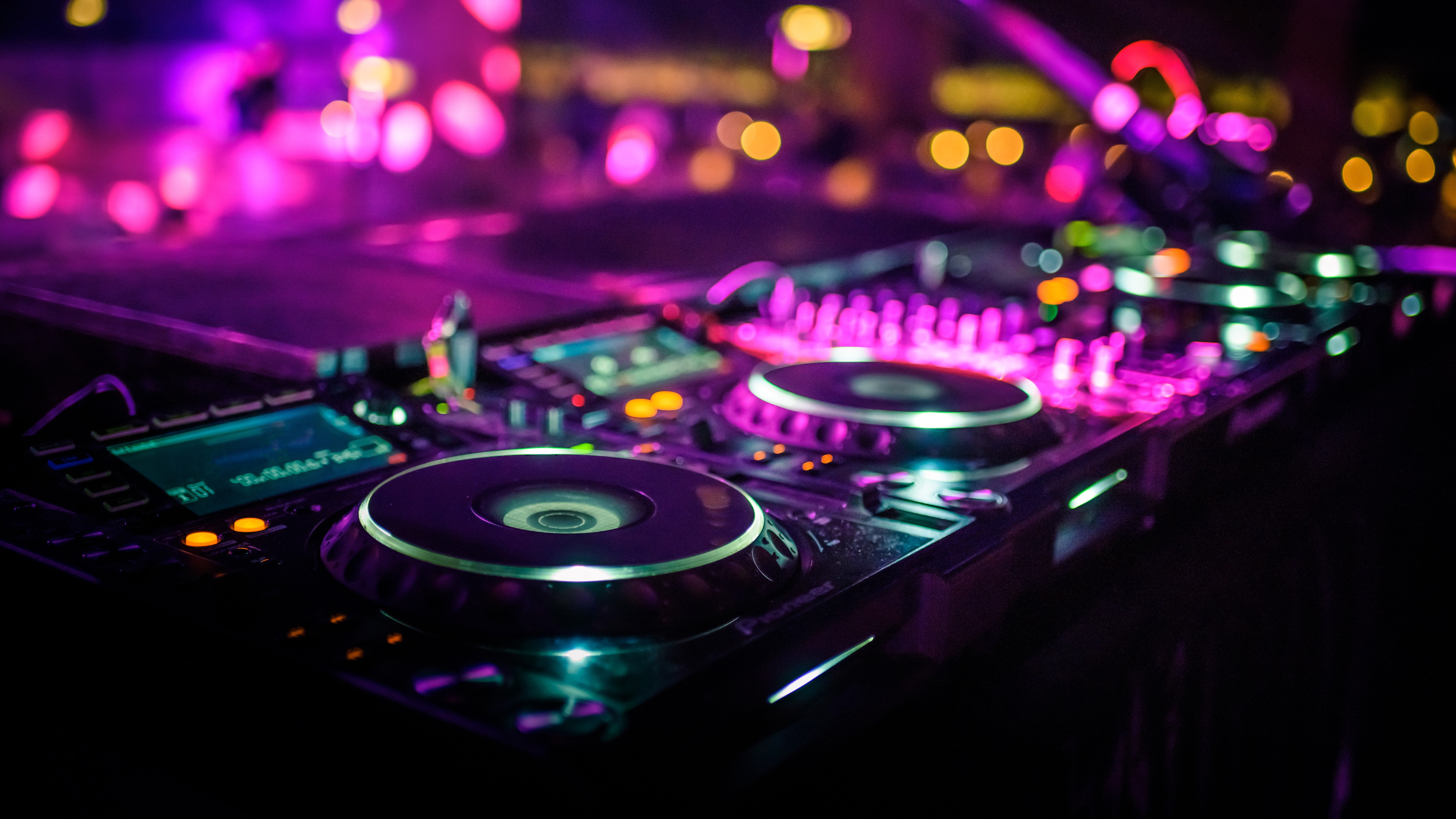
Inputs and outputs: what do you need?
MusicRadar's got your back
The main thing to consider when selecting your beginner DJ mixer is what you’re going to connect it to; in other words, you’re going to need to consider inputs and outputs.
Most DJs start out using their mixer in traditional fashion, as a ‘bridge’ between a pair of CDJs or turntables and an amp. This set-up requires a two-channel mixer which will have (at least) two physical inputs. If you wanted to use more music sources – a pair of CDJs and a pair of turntables, or turntables and a drum machine for example – then you’d need a mixer with more than two channels.
Two-channel mixers are where many DJs start out. Some have two pairs of stereo RCA inputs, ‘phono’ and ‘line’. Phono inputs are for sources with lower signal levels – like vinyl turntables – that need to be amplified within the mixer. Line inputs are for devices with louder signals like CDJs or wired connections from a phone or laptop. Other mixers have a single pair of stereo RCA inputs which can be switched between phono or line.
Many DJ mixers also include a mic input so you can chat over your live streams or let your mates MC.
When it comes to outputs, the bare minimum would be a master output – which goes to your amplifier or powered monitors – and a separate output for your headphones so you can monitor tracks and clearly hear your mixing. Some mixers also provide additional dedicated audio outputs to send to a recording device (record), and to send to monitors to allow close listening when mixing in a club (booth).
If you plan to incorporate a laptop and digital mixing software such as Traktor, Serato, rekordbox or Virtual DJ alongside other sound sources like CDJs, your DJ mixer will need to be kitted out with some kind of digital connectivity. But if you plan on only using a digital set-up and not connecting any turntables or digital decks, then a stand-alone DJ controller will probably be a much better option than a DJ mixer.
When it comes to DJ mixer inputs and outputs, the golden rule is that the more a device has, the more flexibility you will have further down the line.
What is a ‘scratch’ mixer?
Scratch or battle mixers are DJ mixers aimed at turntablists and hip-hop DJs rather than club, house or techno DJs and are designed with the particular requirements of a scratch DJ in mind.
Turntablists use the cross-fader way more than club DJs, so a battle mixer will ideally prioritise room around it. Equally, the crossfaders on a battle mixer should be as high quality as possible to handle sustained usage.
Scratch mixers also sometimes forego club-friendly features such as additional mixer channels, filters or effects.
However, when you’re starting out, the vast majority of two-channel DJ mixers will be a perfectly acceptable entry point to learn essential DJ skills, whether you plan on creating long and gradual club mixes or learn flares, scribbles and beat juggling.
How we test
This guide is based on our experience of hands-on use with the mixers listed, as well as wider, long-term knowledge of using gear from the various DJ brands we’ve covered here.
The MusicRadar team's criteria for selecting the best beginner mixers is based on a multitude of factors. The devices here aren’t necessarily the outright ‘best’ mixers on the market – you’ll need to pay higher, pro-level prices for those. However, these are the mixers that have impressed us by balancing a certain amount of flexibility, reliable build quality and beginner-friendly accessibility, all within a price point that we don’t think is an unreasonable expenditure for those taking their first steps in the world of DJing.
We’ve aimed to bring you a cross section of different mixer styles that should suit a variety of use cases and set-ups. While the ultimate choice will come down to your personal needs and ambitions as a DJ, each mixer here should serve you well until you’re ready to step up to a more advanced set-up.
Find out more about how we test music gear and services at MusicRadar.
Why you can trust us
☑️ Established 2007
☑️ 2.9 million monthly users globally
☑️ 9,500+ reviews on-site
MusicRadar has been in operation from 2007 and has been helping people on their musical journey since then. No matter if you're a producer, guitarist, drummer, keyboardist, DJ or general music enthusiast, you'll find useful information across the site, while our team of experts and industry pros regularly put instruments and gear through their paces to help you make an informed decision.
Along with our in-depth buyer's guides, MusicRadar also provides all the latest news, reviews and how-to features to provide as music information on the music world as possible.
Thanks to you, we receive three million visitors per month, making us the one-stop shop for music makers and lovers worldwide - and we also feature content from our magazine titles such as Future Music, Computer Music, and eMusician.
Meet the experts

I'm the Managing Editor of Music Technology at MusicRadar and former Editor-in-Chief of Future Music, Computer Music and Electronic Musician. I've been messing around with music tech in various forms for over two decades. I've also spent the last 10 years forgetting how to play guitar. Find me in the chillout room at raves complaining that it's past my bedtime.

Harold Heath is a UK music writer and author. A DJ since the late 80s, Harold also produced a few hundred singles and remixes and two artist albums, and worked as a performer, ghostwriter and music-technology teacher. His first book Long Relationships: My Incredible Journey From Unknown DJ to Smalltime DJ was published in 2021.
Latest updates
14/05/25: The guide has been updated with new product entries for Native Instruments Traktor Kontrol Z1 Mk2 and the Numark Scratch. Each of the 8 products featured in the guide now have "at a glance" panels highlighting the pros and cons. We've also added a section focusing on the MusicRadar team's top picks. The FAQ section has been updated and expanded, while a section on why you can trust the MusicRadar team is also now included. There's also now a "meet our experts" section so you get to know the faces behind the creation on this guide.
Read more
- Take a look at the best samplers
- Check out the best drum machines
- Enjoy the best DJ apps and software
- And the best beginner DJ controllers
- Get yourself heard with the best DJ speakers
- Essential DJ accessories for the studio to the booth
Want all the hottest music and gear news, reviews, deals, features and more, direct to your inbox? Sign up here.
I'm the Managing Editor of Music Technology at MusicRadar and former Editor-in-Chief of Future Music, Computer Music and Electronic Musician. I've been messing around with music tech in various forms for over two decades. I've also spent the last 10 years forgetting how to play guitar. Find me in the chillout room at raves complaining that it's past my bedtime.